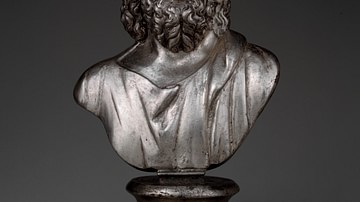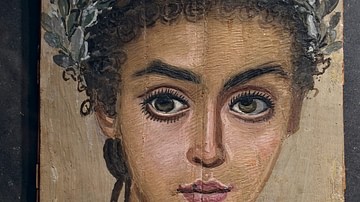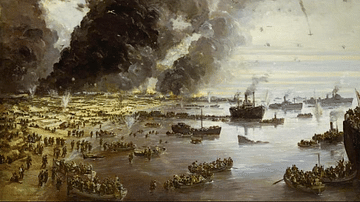Search
Did you mean: Vishnu?
Search Results

Definition
Bartholomew Roberts
Bartholomew Roberts, aka 'Black Bart' Roberts (c. 1682-1722), was a Welsh pirate and one of the most successful villains of the Golden Age of Piracy. Roberts plundered over 400 ships on both sides of the Atlantic during his infamous three-year...

Definition
Serapis
Serapis is a Graeco-Egyptian god of the Ptolemaic Period (323-30 BCE) of Egypt developed by the monarch Ptolemy I Soter (r. 305-282 BCE) as part of his vision to unite his Egyptian and Greek subjects. Serapis’ cult later spread throughout...

Definition
Tarascan Civilization
The Tarascan civilization (aka the Purépecha, after their language) dominated western Mexico and built an empire that would bring it into direct conflict with that other great Mesoamerican civilization of the Post-classic period, the Aztecs...

Definition
Ryujin
Ryujin (aka Ryu-o) is the dragon king, sea god, and master of serpents in Japanese mythology. With his magic jewels he is responsible for the tides, and he represents both the perils and bounty of the sea and so was especially relevant to...

Definition
Banpo Village
Banpo Village is a Neolithic site in the Yellow River Valley, east of Xi'an, Shaanxi Province, in the People's Republic of China. The site was occupied from c. 4500-3750 BCE and covers almost 20 acres. Over 10,000 stone tools and artifacts...

Definition
Uluburun Shipwreck
The Uluburun shipwreck is a Bronze Age vessel discovered lying off the coast of Kas, Turkey. The ship, probably originally from Phoenicia/Canaan, dates to between 1330 and 1300 BCE and was carrying a full cargo of trade goods, perhaps from...

Definition
Fayum
The Faiyum (also given as Fayoum, Fayum, and Faiyum Oasis) was a region of ancient Egypt known for its fertility and the abundance of plant and animal life. Located 62 miles (100 kilometers) south of Memphis (modern Cairo), the Faiyum was...

Definition
Hausaland
Hausaland, sometimes referred to as the Hausa Kingdoms, was a group of small independent city-states in northern central Africa between the Niger River and Lake Chad which flourished from the 15th to 18th century CE. The origins of the Hausa...

Definition
Kingdom of Luba
The Kingdom of Luba, located in central Africa, thrived from the 15th to 19th century CE and was the first such state in the Congo basin. Skills in ironworking and trade along the Lualaba river in such metals as copper permitted the Luba...

Definition
Dunkirk Evacuation
The Dunkirk Evacuation of 26 May to 4 June 1940, known as Operation Dynamo, was the attempt to save the British Expeditionary Force in France from total defeat by an advancing German army. Nearly 1,000 naval and civilian craft of all kinds...